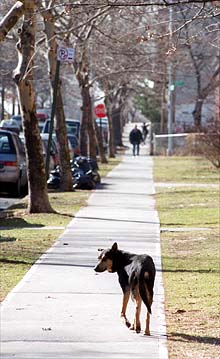

Astoria Journal:
Of Famine and Feast, Kindness and Strangers
By CHARLIE LeDUFF
February 18, 2001
Related Article
• A
Furry Vagrant Is Picked Up in Astoria(Feb. 25, 2001)
| Survival is his full-time
occupation. He is homeless and moves stiffly, like a rusty garden gate.
Mondays are the worst. That is when the pickings are slimmest. The trash man comes Tuesday and Friday to Crescent Street in Astoria, Queens, and Wednesday and Saturday to 26th Street, the next block over. That leaves three skinny days without garbage. Three skinny days of eating on the kindness of strangers. Sundays are good. People in the neighborhood bring him paper plates loaded with leftovers or else they toss bits of bread and ham from their windows. There is a hole in a fence that he can wiggle through and if he is especially hungry he will find the scraps on the ground. But on Mondays, people are concerned with jobs and school books and they pay him little mind. Mondays are the worst. |

Philip Greenberg for The New York Times |
There is nothing important about him. He is a stray dog, nothing more. He is not the head of a bureaucracy who decides whether people will have a power plant erected in their backyards. He is not an immigrant separated from his loved ones by desert and ocean. He did not even appear at the 125th Westminster Kennel Club Dog Show.
The people of the neighborhood feel sorry for him, knowing he has gone from comfortable circumstances to bad ones. He is harmless enough and for these reasons they have not contacted the authorities. "He don't ask for money and he don't bother no one," said Bill Nestor, 63, a retired fender and body man. "People smile when they see him."
The teenagers call him Trixie — as in the tricky way he appears and disappears. The superstitious call him Diablo for the same reason. Some call him Lucky. Lydia Rivera calls him Abraham. "I don't know what his real name is," she said the other day, smiling as he skulked by. "But Abraham, that's a name from the Bible. It just came to me. Abraham. He seems to answer to it. He's a sweet little man. I leave food over there by the bushes where he sleeps."
Abraham is just a dog. But people treat him with a kindness that they do not assign each other. The young men do not pelt Abraham with stones because they respect him and they are afraid of how people on the block will react if they see them attacking a defenseless animal.
There is a 90-year-old woman in the neighborhood. She is pretty and cares about her appearance. She wears makeup and curlers sometimes. She was knocked to the ground by some young men not too long ago. They took her purse.
"People treat dogs better than people," the woman, Betsy Toal, said. "The city is like that."
He has grown visibly older since he started sleeping under the bushes three years ago. His hair is patchy in some places. He walks with a jerky, crooked gait. He was hit by a car last summer. He does not look shabby the way that most tramps do. He is distant but not disoriented.
Abraham's origins are murky. The neighborhood people know that he once belonged to an old man who lived in one of the apartments on Crescent Street. They used to see the old man and Abraham taking evening walks along 20th Avenue, on the sidewalk that separates the apartments from the power plant. The old man may have died because the old man is not around anymore and Abraham lives under the bush.
"I heard that the old guy died and he was just sitting in the apartment for a couple of days before they found him," said Luis Gonzalez, 15. "When the police broke the door down, there was that dog laying next to his master. Crazy, you know? When they took the body out, they just let the dog go and he's been living around the streets ever since."
No one seems to remember the old man's name. "That's New York," said Eugene Perez, 38, a handymen who works at nearby apartment complex and knows Abraham as well as anyone. "Who knows their neighbors' names? Everybody knows the dog, though, because you're not allowed to have pets of your own here. He sort of belongs to everybody and sort of belongs to himself."
The dogcatcher has been prowling around the last few weeks. He's given Abraham a good contest, Mr. Perez said. But the dog is just too clever. The handymen leave the hinged doors to the crawl spaces open for Abraham, and when he sees the dogcatcher coming, the dog hides under the building. "What are they going to do when the get him?" Mr. Perez asked. "Take him to the pound and put him to sleep. They should leave him alone. People here love him and he's having a good life.